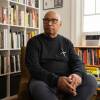On a recent Saturday evening, Nicole Cooper and her 8-year-old son Owen were playing at the Discovery Museum in Acton, which features hands-on exhibits that encourage exploration about math, science and nature.
“It’s super fun,” Owen said as he squeezed a variety of musical instruments on the music wall to create different pitches.
Nicole and Owen came to participate in the museum’s Especially for Me program, which welcomes families and kids with disabilities to the museum for free. Other events, which happen once or twice each month, include autism-friendly evenings, evenings for Deaf and blind visitors, and numerous inclusive afternoons open to everyone.
“He [Owen] has a visual impairment, which makes it difficult to come when it’s very crowded,” Cooper said.
During these “inclusive nights,” the museum is closed to the public, and the museum provides pizza for all the families.
“This is an opportunity for folks to come in and explore the museum when there’s a little less people around and there’s a lot less judgment. It’s a judgment-free zone,” said Susan Heilman, director of community partnerships.
Suzanne Price came with her 4-year-old daughter Gwendolyn, who has autism. Gwendolyn was exploring the math-themed area of the museum, which features exhibits to learn about probability, and one with ice cream cones and scoops to learn about counting and number combinations.
Price said Gwendolyn can get overstimulated easily, and it can be hard to keep track of her in busy spaces, so these special events are helpful for her family.
“I think also just the feeling of knowing that all the other families that are here tonight have a child in a similar situation,” Price said. “So it just puts both my husband and I at ease in terms of what she’s doing, where she is and her safety.”
In a play diner and kitchen, Meghan Woodward’s daughter Savannah was busy opening the oven, making coffee and assembling a sandwich. It was their first time coming to the museum.
“It’s a quiet place for her to be. She gets to explore around and be able to express her personality,” Woodward said. “And she loves cooking”
Sensory-friendly and accessible events like these are becoming more common at museums and cultural institutions to welcome guests with disabilities, including at the Museum of Science, Boston Ballet and Boston Symphony Orchestra.
The Discovery Museum’s program started 25 years ago and has expanded over the years. Last year, the museum added events for adults over 18 with autism and intellectual disabilities, after staff heard that many adults who live in group homes are isolated and missing out on cultural experiences.
“They said there’s not a lot of places for them,” Heilman said.
The museum’s campus was renovated in 2018 to be fully accessible, including the Discovery Woods, which features a treehouse nestled 15 feet up in a birch tree that is accessible for strollers and wheelchairs. The museum offers a sensory map in eight languages, and features a “take a break” space with a weighted blanket and fidget spinners. It offers events like a dance class with a Deafblind instructor and staff have been encouraged to learn ASL.
CEO Marie Beam says that the museum has been “ahead of the curve” on welcoming visitors with disabilities. The museum won a National Medal for Museum and Library Service from Institute of Museum and Library Service in 2024, in part because of its commitment to accessibility.
One of the most popular exhibits is the water gallery, where kids were splashing, throwing toys into buckets and using tools to create shapes in water streams. Some families that come to the museum are regulars.
“I mostly like the water room. It’s very fun,” said Jameson as he assembled green and metallic paper together in the da Vinci Workshop, where supplies are provided so kids can experiment with making creations. His mom Meghan Belcher said that they come to the Discovery Museum at least once a month.
Next to the workshop, the Roy family was sitting at a picnic table. Their 7-year-old twins Angus and Rhys were hunched over an assortment of wires and chord building circuits. Deb Roy said they’ve been coming to the inclusive events for four years.
“This [Discovery Museum] really does kind of feel like an extended family to us because we know the faces; they know us,” Roy said. “When we come in here, it feels like it’s an extension of our own home.”








